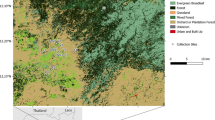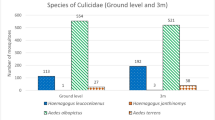Abstract
COLLECTIONS of mosquitoes have been made regularly throughout the dry season in the desert west of Omdurman, Sudan, by means of pyrethrum-spraying, well-traps and hand catching. The results indicate that adult female Anopheles gambiae (sp. B ?) Giles survive throughout the dry season, but with a change in their physiology and behaviour. The insects were found to hide in dwelling huts (87.7 per cent), in cracks down dry wells (8.5 per cent), in disused or ruined houses (3.2 per cent) and in rabbit and rodent burrows (0.5 per cent). Dissection showed that 77.1 per cent of the nulliparous females captured were engorged with blood. Of these, 90.6 per cent contained human blood. The ovaries evidently undergo only one gonotrophic cycle during the dry season, developing extremely slowly so that, when the rains come, the gravid females are ready to oviposit. These mosquitoes are apparently unable to lay eggs during the dry season.
This is a preview of subscription content, access via your institution
Access options
Subscribe to this journal
Receive 51 print issues and online access
$199.00 per year
only $3.90 per issue
Buy this article
- Purchase on Springer Link
- Instant access to full article PDF
Prices may be subject to local taxes which are calculated during checkout
Similar content being viewed by others
Author information
Authors and Affiliations
Rights and permissions
About this article
Cite this article
OMER, S., CLOUDSLEY-THOMPSON, J. Dry Season Biology of Anopheles gambiae Giles in the Sudan. Nature 217, 879–880 (1968). https://doi.org/10.1038/217879b0
Received:
Issue Date:
DOI: https://doi.org/10.1038/217879b0
This article is cited by
-
Potential persistence mechanisms of the major Anopheles gambiae species complex malaria vectors in sub-Saharan Africa: a narrative review
Malaria Journal (2023)
-
Impact of aerial humidity on seasonal malaria: an ecological study in Zambia
Malaria Journal (2022)
-
Resolving malaria’s dry-season dilemma
Nature Ecology & Evolution (2022)
-
Induction of long-lived potential aestivation states in laboratory An. gambiae mosquitoes
Parasites & Vectors (2020)
-
Modelling the potential of genetic control of malaria mosquitoes at national scale
BMC Biology (2019)
Comments
By submitting a comment you agree to abide by our Terms and Community Guidelines. If you find something abusive or that does not comply with our terms or guidelines please flag it as inappropriate.



